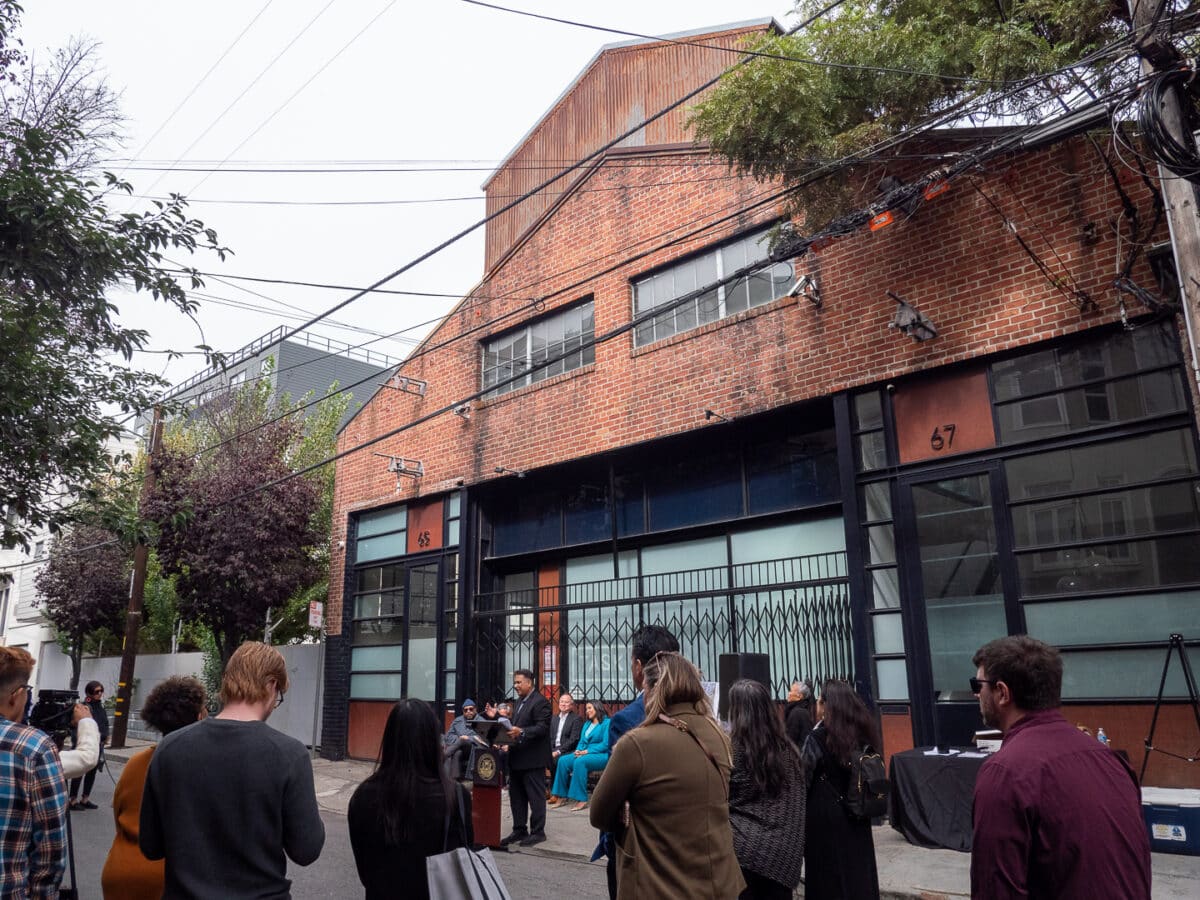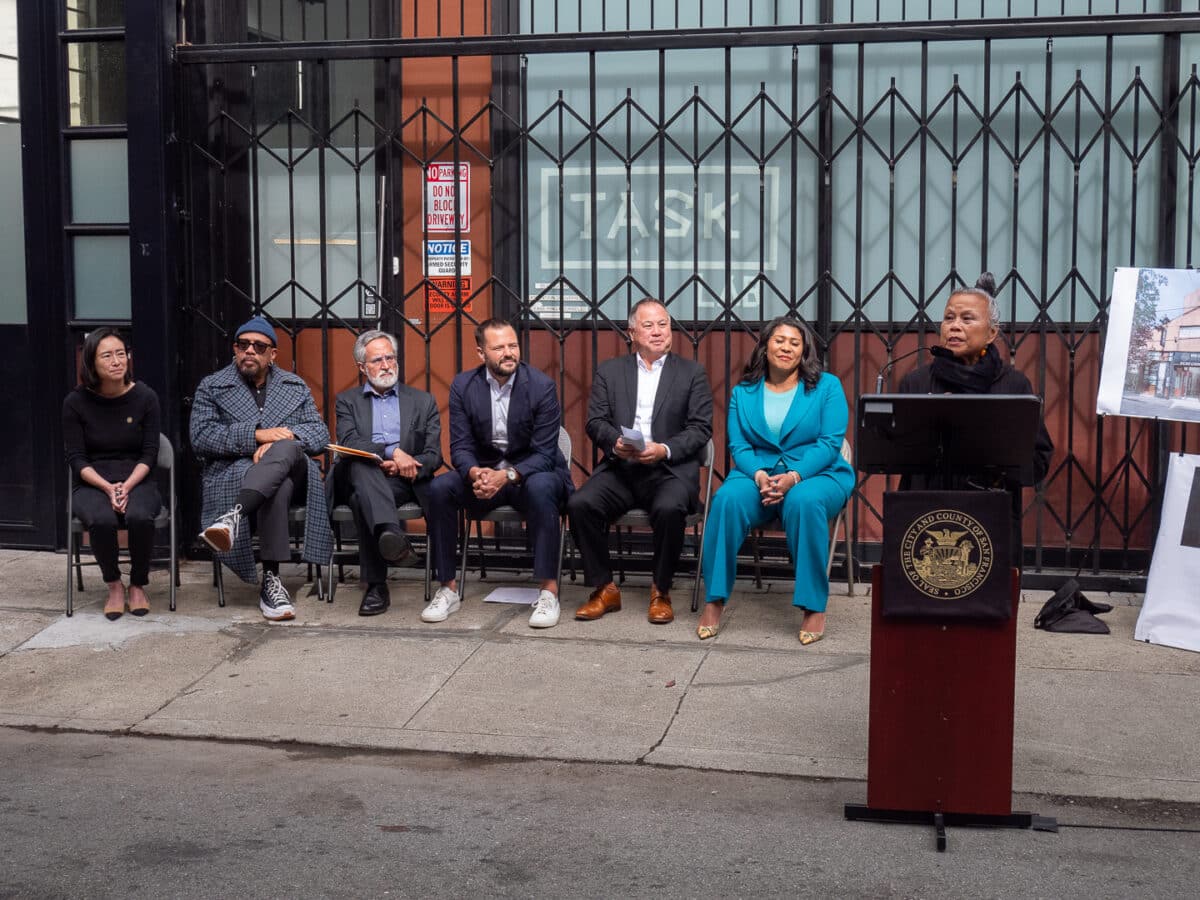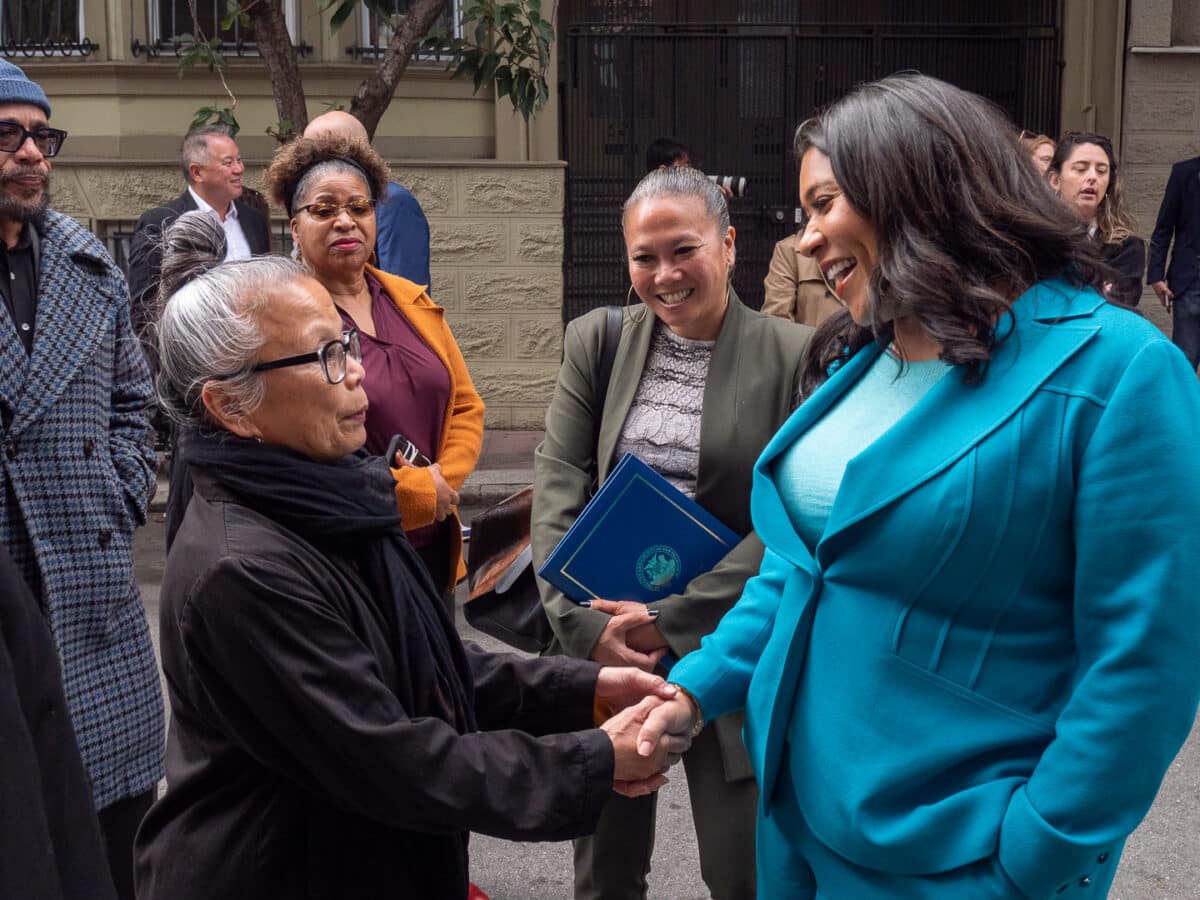New performance space in SOMA Pilipinas to promote AAPI, Fil-Am arts

APICC Executive Director Vinay Patel (left) and San Francisco Board of Supervisors President Aaron Peskin look at renditions of APICC and KULARTS permanent performance facility and headquarters. Photo by Wilfred Galila
SAN FRANCISCO – Two legacy Asian American arts organizations – the Asian Pacific Islander Cultural Center (APICC) and Kulintang Arts (KULARTS) – have partnered for the historic acquisition of 262 7th Street, where they plan to open a performance space focused on Asian and Filipino American arts.
It will be the very first permanent performance facility in SOMA Pilipinas, San Francisco’s Filipino Cultural Heritage District.
The acquisition of the site, envisioned as a cultural anchor for the SOMA community, is a significant milestone in APICC’s 28 years and KULARTS’ 40 years of advancing the arts.
In a statement, Mayor London Breed said that as San Francisco honors Filipino American History Month in October, “there isn’t a more fitting moment to come together” to celebrate the acquisition of the site.

APICC Executive Director Vinay Patel addresses the crowd during the press conference. Photo by Wilfred Galila
The 10,750-square-foot permanent performance facility will include a state-of-the-art performance space and a gallery space. It will also serve as headquarters for APICC and KULARTS, both cultural institutions and pillars of the Asian American Pacific Islander (AAPI) arts community.
This was made possible through a generous grant from the API Equity Fund, crucial state funding through the advocacy of Assemblymembers Matt Haney and Phil Ting, and the San Francisco Arts Commission’s SOMA Cultural Anchor Fund.
A joint press conference by APICC and KULARTS on Oct. 9 was attended by community members and leaders, including KULARTS Artistic Director Alleluia Panis, APICC Executive Director Vinay Patel, Mayor London Breed, Assemblyman Matt Haney, Supervisor Connie Chan, Board of Supervisors President Aaron Peskin, Assemblyman Phil Ting and Director of Cultural Affairs Ralph Remington.

KULARTS Artistic DirectorAlleluia Panis speaks during the press conference. Sitting behind her are (from left) Supervisor Connie Chan, Director of Cultural Affairs Ralph Remington, Board of Supervisors President Aaron Peskin, Assemblyman Matt Haney, Assemblyman Phil Ting and Mayor London Breed. Photo by Wilfred Galila
“It’s been over 39 years of jumping from one theater rental to another to produce our shows and our gallery exhibitions, and we are so, so excited to finally reach this extraordinary milestone for the Filipino community,” said Panis.
“We are super, super excited to be the co-owner with APICC of this dedicated professional arts facility for the advancement of Filipino, indigenous and diasporic art.”
Panis said the space is envisioned to empower future generations of artists and audiences who want to see themselves, their experiences and their histories highlighted on stage and in visual exhibitions and education programs.
“I invite you to build with us and together let us contribute to the vibrancy of San Francisco,” she said.

KULARTS Artistic Director Alleluia Panis (left) with Mayor London Breed. Photo by Wilfred Galila
Patel thanked their supporters, saying, “One day we’ll be able to tell the in-depth story of everything that went on. But we got here. I want to thank, most importantly, our artists and our community that have waited so long and supported us for almost three decades to get to this place, to have a space.”
Mayor Breed thanked Panis and Patel for the “incredible work” they have done “to make these virtual centers a reality.”
She acknowledged Pam Wu, Jeff Jones and Deborah Walker and many others in the arts community who had “fought for an opportunity to ensure that this city made investments in our arts community all over San Francisco.”
Breed recognized Connie Chan for her work with the API Equity Fund that provided opportunities for the community to own their own spaces. She also thanked Assemblymembers Matt Haney and Phil Tang “for ushering in some additional state resources to really, finally get the job done” and Board of Supervisors President Aaron Peskin, who has been instrumental in helping establish the fund.
“It just shows you what happens when the city, the state, all our various government agencies really work together,” Assemblyman Ting said,
Assemblyman Haney said the AAPI and Filipino communities in San Francisco have contributed so much to the city and “have enriched the cultural life and diversity of our city.”
A befitting achievement during Filipino American History Month, the acquisition of the site is just the initial step. The construction of the facility will take at least two years.
“I can’t wait to come back for the official ribbon cutting and opening when we’re finally seeing performances and just so excited to actually be here,” said Ting. “It just demonstrates what great things can happen when the community perseveres.”
Founded in 1996, APICC has been a cornerstone for cultural advocacy in San Francisco. The organization supports and promotes the arts within the AAPI community, with a special focus on artistic and cultural programming that reflects the experiences and contributions of Asian and Pacific Islander Americans.
For 28 years, APICC has produced the annual United States of Asian America Festival, which highlights the creativity and diversity of AAPI artists in San Francisco.
Founded in 1985, KULARTS has been the premier presenter of contemporary and tribal Pilipino arts in the United States. The mission of KULARTS is to inform and expand the understanding of American Pilipino culture through works that address contemporary issues in our community.
The organization plays a critical role in nurturing the artistic development of Pilipino American artists. It also aims to preserve the spirit and integrity of ancient Pilipino art forms through research, education and documentation.

